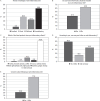Assessment of parents' awareness of the anti-inflammatory diet and its impact on their child's health: survey study
- PMID: 39451185
- PMCID: PMC11538915
- DOI: 10.5114/pedm.2024.142589
Assessment of parents' awareness of the anti-inflammatory diet and its impact on their child's health: survey study
Abstract
Introduction: The latest evidence highlights that an unhealthy diet and poor nutrition status are some of the modifiable behavioural risk factors responsible for the development of non-communicable diseases (NCDs). Anti-inflammatory diets are important in both the treatment and prevention of disease (e.g. hypertension, obesity, Hashimoto's thyroiditis). The concept of these diets has common core foundations and recommendations. The family environment from early childhood plays a particularly important role in shaping healthy eating patterns of children and youths. Thus, parents' nutritional knowledge, attitudes, and dietary practices are essential in preventing NCD development and improving their children's health as their primary guardians. This study aims to assess parents' awareness of an anti-inflammatory diet.
Material and methods: A total of 325 parents participated in the study. Data for the study were collected anonymously using the CAWI method. The research tool was an original questionnaire about parents' awareness of anti-inflammatory diets.
Results: Of the 325 parents participating in the study, 204 (62.8%) admitted that they did not know which products to use in an anti-inflammatory diet. About half of them (165; 50.8%) had unsatisfactory knowledge of the anti-inflammatory diet, 66 (30.3%) had a good level of knowledge, and only 16 (5.5%) respondents had an excellent level of knowledge.
Conclusions: Parental awareness of the use of the anti-inflammatory diet was insufficient in the study group. It seems important to implement appropriate educational activities on the anti-inflammatory diet to expand parents' knowledge of the impact of nutrition on children's development.
Wprowadzenie: Najnowsze dowody podkreślają, że niezdrowa dieta i zły stan odżywienia są jednym z modyfikowalnych behawioralnych czynników ryzyka odpowiedzialnych za rozwój chorób niezakaźnych (m.in. nadciśnienie, choroba otyłościowa, zapalenie tarczycy – choroba Hashimoto). Diety przeciwzapalne mają istotne znaczenie zarówno w leczeniu, jak i w zapobieganiu chorobom. Przykłady diet przeciwzapalnych obejmują tradycyjną dietę śródziemnomorską, dietę DASH oraz tradycyjną dietę okinawską, nordycką lub meksykańską. Koncepcja tych diet ma wspólne podstawy i zalecenia. Środowisko rodzinne od wczesnego dzieciństwa odgrywa szczególnie ważną rolę w kształtowaniu zdrowych wzorców żywieniowych dzieci i młodzieży. Tym samym wiedza rodziców na temat odżywiania, ich postawy i praktyki żywieniowe są niezbędne w zapobieganiu rozwojowi chorób niezakaźnych i poprawie zdrowia ich dzieci jako ich głównych opiekunów. Celem niniejszej pracy jest ocena świadomości rodziców na temat diety przeciwzapalnej.
Materiał i metody: W badaniu wzięło udział 325 rodziców. Dane do badania zostały zebrane anonimowo metodą CAWI. Narzędziem badawczym był autorski kwestionariusz dotyczący świadomości rodziców na temat diety przeciwzapalnej.
Wyniki: pośród 325 rodziców biorących udział w badaniu, 204 (62.8%) przyznało, że nie wie, jakie produkty należy stosować w diecie przeciwzapalnej. Około połowa z nich (165; 50.8%) miała niezadowalającą wiedzę na temat diety przeciwzapalnej, 66 (30.3%) miało dobry poziom wiedzy, a tylko 16 (5.5%) respondentów miało doskonały poziom wiedzy.
Wnioski: Świadomość rodziców na temat stosowania diety przeciwzapalnej w badanej grupie była niewystarczająca. Istotne wydaje się wdrożenie odpowiednich działań edukacyjnych na temat diety przeciwzapalnej w celu poszerzenia wiedzy rodziców na temat wpływu żywienia na rozwój dzieci.
Keywords: anti-inflammatory activities.; diet; inflammation; nutrition; parental awareness; children.
Conflict of interest statement
not declared.
Figures
References
-
- Global burden of noncommunicable diseases [Internet] . PRB. Available at https://www.prb.org/resources/global-burden-of-noncommunicable-diseases/ (Access: 25.06.2024).
MeSH terms
Substances
LinkOut - more resources
Full Text Sources

